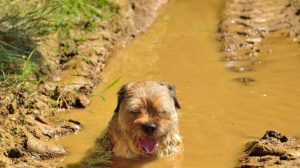When caught early, canine pancreatitis is often treatable. However, you must be prepared to make permanent changes to your pet’s diet.

Inflammation of the pancreas, also known as pancreatitis, causes severe digestive and metabolic disorders. The inflamed organ has trouble continuing to secrete enough enzymes to break down food into its smallest components. As a result, digestion no longer works properly. The disease manifests itself in your dog, for example, in abdominal pain, diarrhoea, vomiting and loss of appetite.
Treatment with infusions
Many patients with pancreatitis are dehydrated and experience hyperacidity and electrolyte imbalances due to diarrhoea and vomiting. These problems can be life-threatening and must be treated with IV fluids. Therefore, admitting patients with acute pancreatitis as inpatients usually makes sense. An anti-vomiting agent is also useful for animals that are constantly throwing up. In extreme cases, the four-legged friend must be fed through a tube.
Treatment with painkillers
Pancreatitis is extremely painful, as many sufferers report. The same applies to the four-legged friends, who show clear signs of great pain in many cases. However, even those dogs that suffer from pancreatitis and appear to have little pain often benefit from pain medication. They often experience a significant improvement in their general well-being.
Reason enough that every dog with pancreatitis should receive pain therapy. The morphine-like substances, also known as opioids, are injected or applied through the skin with a patch. All other medications are discontinued so as not to put additional strain on your four-legged friend’s body. To wash as cleanly as possible and not to burden unnecessarily.
Light diet as part of a permanent treatment
Diet plays an important role in the treatment of pancreatitis in dogs. In the case of acute pancreatitis, the animal is often only given liquid food for the first few days so that the production of digestive enzymes is reduced and the pancreas is protected. Especially if permanent damage to the pancreas has occurred, light food is the order of the day in the future.
It should be fed in small portions throughout the day and be easily digestible and low in fat. For example, heated muscle meat and lean milk products are suitable. Often vitamins and folic acid must also be added. Check this with your veterinarian. He will also tell you if your four-legged friend needs additional preparations to replace missing digestive enzymes that the pancreas may no longer be able to produce.








